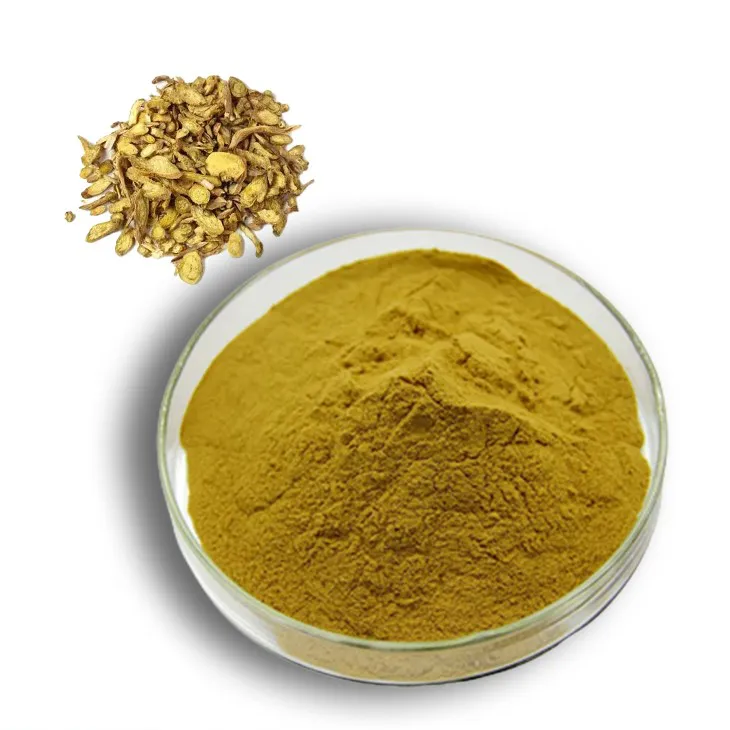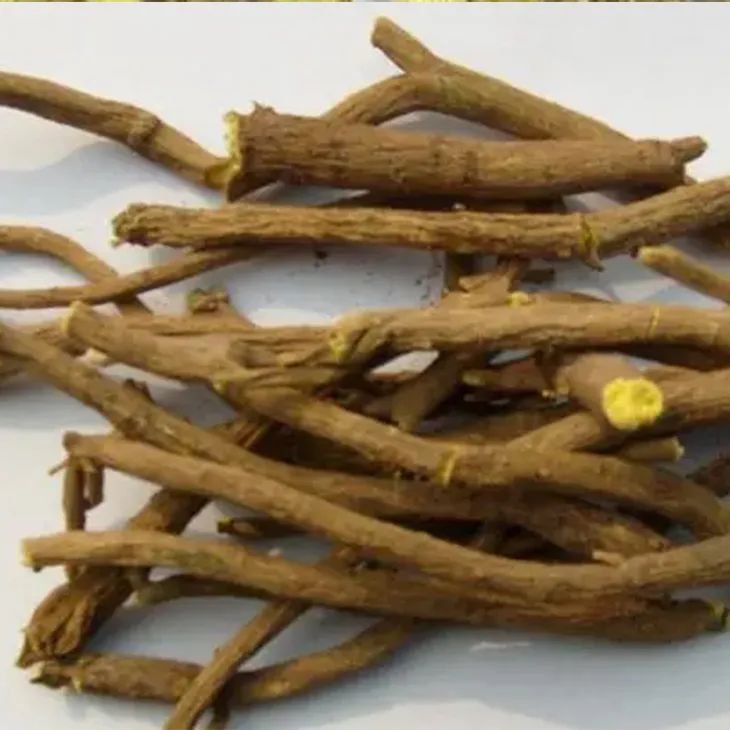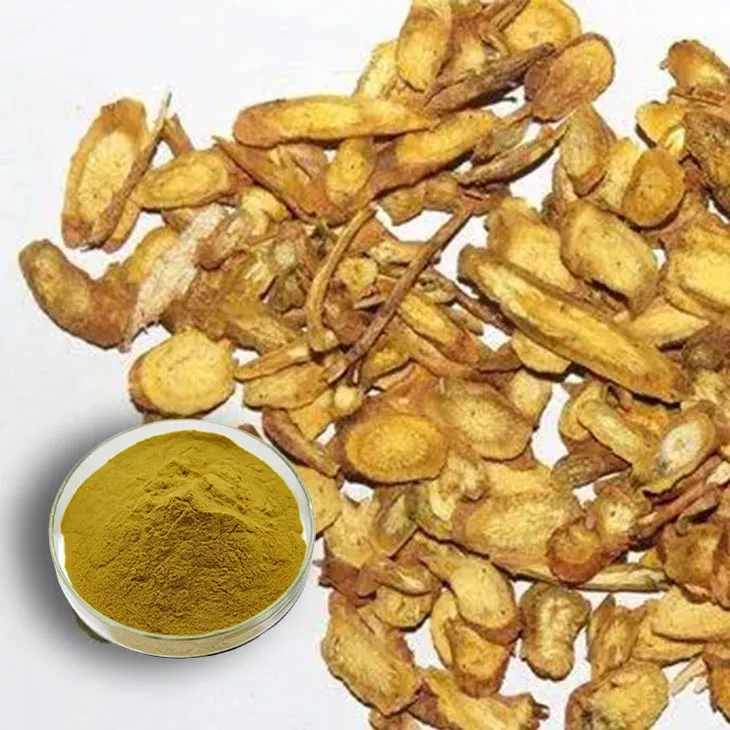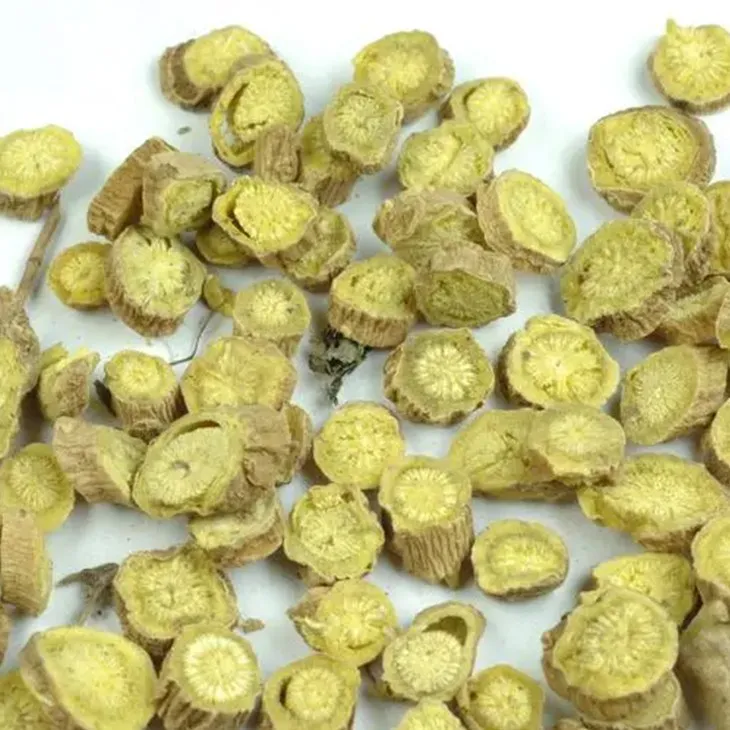- 0086-571-85302990
- sales@greenskybio.com
Baicalin in Trinidad and Tobago.
2024-12-10

1. Introduction to Baicalin
Baicalin is a bioactive compound that has drawn significant attention in the fields of medicine and pharmacology. It is derived from the roots of Scutellaria baicalensis, a plant with a long history of use in traditional Chinese medicine. Baicalin has demonstrated a wide range of pharmacological activities, including anti - inflammatory, antioxidant, antibacterial, and antiviral properties.
The chemical structure of baicalin consists of a flavone moiety, baicalein, and a glucuronide moiety. This unique structure is responsible for its diverse biological activities. For example, the antioxidant activity of baicalin is attributed to its ability to scavenge free radicals, which can prevent oxidative damage to cells and tissues.

2. Trinidad and Tobago: A Brief Overview
Trinidad and Tobago is a twin - island nation located in the southern Caribbean. It is known for its rich cultural diversity, which is a blend of African, Indian, European, and indigenous influences. This cultural mix is reflected in various aspects of the country's life, including its music, dance, food, and traditional medicine practices.
The nation is also blessed with abundant natural resources. Its tropical climate supports a diverse range of flora and fauna. The unique geographical location and ecological environment of Trinidad and Tobago may potentially harbor plants or substances with properties similar to baicalin or even baicalin itself.

3. Traditional Medicine in Trinidad and Tobago
3.1 Local Medicinal Practices
Trinidad and Tobago has a rich heritage of traditional medicine. Local healers, often referred to as "bush doctors" or "herbalists," use a variety of plants and natural substances to treat different ailments. Although there is no conclusive evidence yet, it is possible that some of these traditional remedies may contain substances with properties similar to baicalin.
For instance, certain plants in the local flora may have anti - inflammatory or antioxidant properties, which are characteristics also associated with baicalin. Investigating these local medicinal practices could not only help in the preservation of the country's cultural heritage but also potentially lead to the discovery of new sources of bioactive compounds.
3.2 The Potential Link with Baicalin
If there are plants in Trinidad and Tobago that contain baicalin or related compounds, it could open up new avenues for traditional medicine in the region. The knowledge of baicalin's medicinal properties could be integrated into the existing traditional medicine practices, providing more effective treatment options for local communities.
Moreover, understanding the role of baicalin - like substances in local medicine could also contribute to the global understanding of traditional medicine systems. It could help in establishing connections between different traditional medicine practices around the world and promote cross - cultural exchange in the field of medicine.

4. Scientific Research on Baicalin in Trinidad and Tobago
4.1 The Importance of Research
From a scientific research perspective, studying baicalin in Trinidad and Tobago is of great significance. The unique ecological environment of the islands may give rise to baicalin or related compounds with distinct properties compared to those found in other regions.
Research on baicalin in Trinidad and Tobago could contribute to a deeper understanding of its pharmacokinetics and pharmacodynamics. For example, how baicalin is absorbed, distributed, metabolized, and excreted in the human body may vary depending on the local ecological factors, such as soil composition, climate, and the presence of other co - occurring substances.
4.2 Potential for New Drugs and Therapies
The study of baicalin in Trinidad and Tobago also holds great potential for the development of new drugs and therapies. Baicalin has already shown promise in treating various diseases, such as respiratory infections, inflammatory bowel disease, and certain types of cancer.
If unique forms of baicalin or related compounds are discovered in Trinidad and Tobago, they could be further developed into novel drugs with enhanced efficacy and fewer side effects. This could have a significant impact on global healthcare, providing new treatment options for patients with currently incurable or difficult - to - treat diseases.

5. International Cooperation in Baicalin - related Research
Given the potential of baicalin in Trinidad and Tobago, international cooperation in research and development related to this compound is highly desirable. International collaboration can bring together the expertise, resources, and technologies from different countries.
For example, researchers from developed countries with advanced laboratory facilities can partner with local researchers in Trinidad and Tobago who have in - depth knowledge of the local flora and traditional medicine practices. This partnership can lead to more comprehensive and in - depth research on baicalin.
International cooperation can also facilitate the sharing of research findings and the standardization of research methods. This will ensure that the research on baicalin in Trinidad and Tobago is of high quality and can be integrated into the global scientific community.
6. Challenges and Opportunities
6.1 Challenges
- Limited Resources: Trinidad and Tobago may face challenges in terms of research funding, laboratory facilities, and trained personnel. Adequate resources are required to conduct in - depth research on baicalin.
- Regulatory Hurdles: There may be regulatory challenges in the development and commercialization of baicalin - based products. Ensuring compliance with international and local regulations is crucial for the successful translation of research findings into practical applications.
- Preservation of Traditional Knowledge: While modern research on baicalin can benefit from traditional medicine knowledge, there is a need to ensure that the intellectual property rights of local communities are protected and that their traditional knowledge is not misappropriated.
6.2 Opportunities
- Economic Development: The discovery and development of baicalin - related products could contribute to the economic development of Trinidad and Tobago. It could lead to the creation of new industries, such as the production of herbal supplements or pharmaceuticals.
- Enhanced Healthcare: Baicalin - based therapies could improve the healthcare options available to the local population. This could lead to better health outcomes and a reduced burden on the healthcare system.
- Cultural Promotion: Research on baicalin can also promote the cultural heritage of Trinidad and Tobago. It can raise awareness of the country's traditional medicine practices and their potential contributions to modern medicine.
7. Conclusion
In conclusion, the study of baicalin in Trinidad and Tobago is a multi - faceted and exciting area of research. The potential connection between baicalin and the traditional medicine practices in the region, as well as the scientific research opportunities it presents, make it a topic worthy of further exploration.
Despite the challenges, there are also significant opportunities for international cooperation, economic development, enhanced healthcare, and cultural promotion. By addressing the challenges and seizing the opportunities, Trinidad and Tobago can play an important role in the global research and development of baicalin - related products.
FAQ:
1. What is the potential of baicalin in Trinidad and Tobago's traditional medicine?
As of now, it's not certain if there are direct uses of baicalin in Trinidad and Tobago's traditional medicine. However, if there are local practices involving substances with similar properties to baicalin, it could provide insights into the region's medical cultural heritage. By exploring these possible connections, we may find that baicalin - like substances play a role in treating certain ailments in traditional ways, which could be further studied and integrated into modern healthcare understanding.
2. How can scientific research on baicalin in Trinidad and Tobago contribute to new drug development?
The unique geographical and ecological characteristics of Trinidad and Tobago may result in unique forms of baicalin or related compounds. These unique forms could have distinct properties compared to those in other parts of the world. Scientists can study these properties to understand how they interact with biological systems. This knowledge can then be used to develop new drugs or therapies, for example, by identifying new mechanisms of action or finding more effective ways to target specific diseases.
3. Are there any ongoing research projects on baicalin in Trinidad and Tobago?
There is no information indicating specific ongoing research projects on baicalin in Trinidad and Tobago at present. However, given its potential, it is an area that could attract research interest in the future. International cooperation might also play a role in initiating such projects, as the country's unique features could offer valuable resources for studying baicalin.
4. What makes Trinidad and Tobago a special place for baicalin research?
Trinidad and Tobago has unique geographical and ecological characteristics. These may lead to the existence of unique forms of baicalin or related compounds. Additionally, its rich cultural heritage in traditional medicine could hold clues about substances similar to baicalin. All these factors combined make it an exciting and special place for researching baicalin.
5. How could international cooperation be beneficial for baicalin research in Trinidad and Tobago?
International cooperation can bring in diverse scientific expertise and resources. Other countries may have advanced research techniques or a deeper understanding of baicalin from different geographical contexts. In Trinidad and Tobago, with its unique forms of baicalin or related compounds, international partners can collaborate to study these unique aspects. This can lead to a more comprehensive understanding of baicalin and accelerate the development of new drugs or therapies based on it.
Related literature
- Baicalin: Pharmacological Properties and Therapeutic Applications"
- "The Role of Bioactive Compounds in Traditional Medicines: A Global Perspective"
- "Exploring Medicinal Compounds in Unique Geographical Areas: Case Studies"
- ▶ Hesperidin
- ▶ Citrus Bioflavonoids
- ▶ Plant Extract
- ▶ lycopene
- ▶ Diosmin
- ▶ Grape seed extract
- ▶ Sea buckthorn Juice Powder
- ▶ Fruit Juice Powder
- ▶ Hops Extract
- ▶ Artichoke Extract
- ▶ Mushroom extract
- ▶ Astaxanthin
- ▶ Green Tea Extract
- ▶ Curcumin
- ▶ Horse Chestnut Extract
- ▶ Other Product
- ▶ Boswellia Serrata Extract
- ▶ Resveratrol
- ▶ Marigold Extract
- ▶ Grape Leaf Extract
- ▶ New Product
- ▶ Aminolevulinic acid
- ▶ Cranberry Extract
- ▶ Red Yeast Rice
- ▶ Red Wine Extract
-
Acerola Extract
2024-12-10
-
Nettle leaf extract
2024-12-10
-
Cat Claw Extract
2024-12-10
-
Black Pepper Extract
2024-12-10
-
Pine bark Extract Powder
2024-12-10
-
Peppermint Extract Powder
2024-12-10
-
Hops Extract
2024-12-10
-
Pueraria Lobata Extract
2024-12-10
-
White Willow Bark Extract
2024-12-10
-
Moringa powder
2024-12-10





















